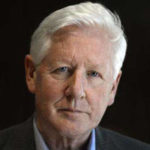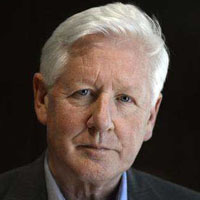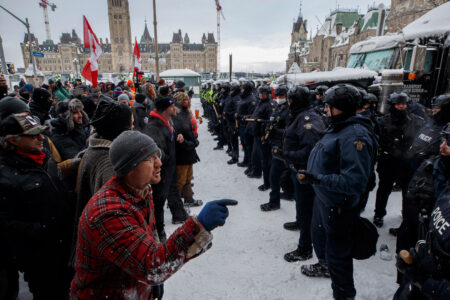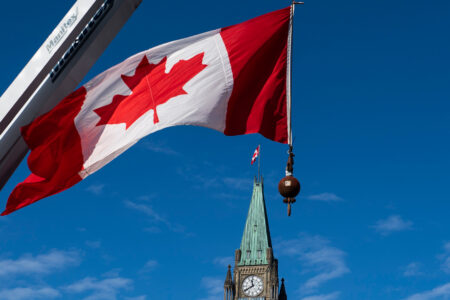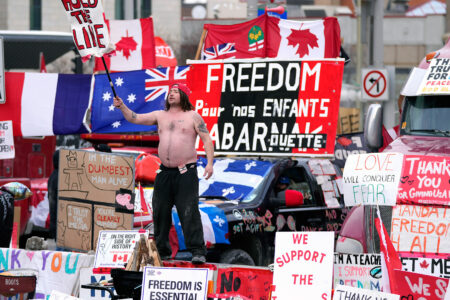
On a cold January day, a young, vigorous president, whose style and substance seemed to capture the imagination of a generation, spoke these brave words:
The same revolutionary beliefs for which our forebears fought are still at issue around the globe — the belief that the rights of man come not from the generosity of the state, but from the hand of God. We dare not forget today that we are the heirs of that first revolution. Let the word go forth from this time and place, to friend and foe alike, that the torch has been passed to a new generation of Americans — born in this century, tempered by war, disciplined by a hard and bitter peace, proud of our ancient heritage, and unwilling to witness or permit the slow undoing of those human rights to which this nation has been committed, and to which we are committed today at home and around the world. Let every nation know, whether it wishes us well or ill, that we shall pay any price, bear any burden, meet any hardship, support any friend, oppose any foe, in order to assure the survival and the success of liberty.
The words were, of course, spoken by John Fitzgerald Kennedy, war hero, charismatic senator, and exemplar of a generation that was ready to take its place at the helm of power. Thomas Paine would have been proud of the rhetoric. Edmund Burke would have taken the last sentence and crossexamined long and hard. Like many rhetorical flourishes, it contained a promise that could not be kept.
Kennedy’s self-confidence, some might say hubris, led to the disaster at the Bay of Pigs, the CIA-financed and organized invasion of Cuba by exiles that ended in humiliation. Bad intelligence, exaggerated claims of what could be done and achieved, a goofball execution, and misleading public diplomacy led to defeat, retreat, and capture. The Bay of Pigs misadventure was a dry run for the Americans’ calamitous engagement in Vietnam. Historians will debate into the distant future whether Kennedy would have reduced the US military commitment had he lived, but the fact remains that the core members of the Kennedy team — Robert McNamara, McGeorge Bundy, Walt Rostow among others — remained at the heart of American policy in Vietnam throughout the 1960s, and were responsible for advising President Lyndon Johnson on the need to expand troop commitments from a few thousand “advisers” to hundreds of thousands of troops, to go from assisting the South Vietnamese government to counter a Viet Cong guerrilla movement to waging a full scale war on North Vietnam that was expanded later by Richard Nixon and Henry Kissinger to Cambodia.
Johnson’s promise that “we seek no wider war” may have been spoken with sincerity, but a vastly wider war it became, as the bombs followed the movement of fighters and supplies between Ho Chi Minh’s government in the north and the guerrilla movements in South Vietnam.
The floor manager for the passage of the Gulf of Tonkin resolution was Arkansas Senator J. William Fulbright, chairman of the Senate Foreign Relations Committee. Writing of the speedy passage of the resolution two years later, Fulbright described his own role as “a source of neither pleasure nor pride to me today.” A patrician voice of the Old South, Fulbright soon started to speak out against the decision to commit American lives and money in Vietnam.
We are not engaged in a war to “defend freedom” in South Vietnam. Unlike the Republic of Korea, South Vietnam has an army which fights without notable success and a weak, dictatorial government which does not command the loyalty of the South Vietnamese people…I do not question the power of our weapons and the efficiency of our logistics…What I do question is the ability of the United States or any other Western nation to go into a small, alien, undeveloped Asian nation and create stability where there is chaos, the will to fight where there is defeatism, democracy where there is no tradition of it, and honest government where corruption is almost a way of life.
Fulbright was calling for nothing than a change in America’s basic assumptions: about itself, about the world around it, about what it would take to create a new partnership between the American people and the rest of the world. This change was not to be.
No leader in modern times has spoken with such emphasis about the connection between freedom, democracy, and foreign policy as President George Walker Bush. It was not a rhetoric he came to immediately. After he took office at the turn of the century, Bush put nation-building on the back burner. His first inaugural address was not memorable, and did not extend beyond the usual bromides. All this changed with al-Qaeda’s attack on the Twin Towers, the Pentagon, and United Airlines Flight 93 on September 11, 2001.
While al-Qaeda had been linked to several other attacks on American interests — in the basement of the Twin Towers in 1993, the US military headquarters in Saudi Arabia in 1995 and 1996, US embassies in Nairobi and Dar es Salaam in 1998 and a US navy vessel in Yemen in 2000 — the breathtaking scale and execution of the assault, and the subsequent tragic collapse of the iconic towers of the World Trade Center on that infamous day transformed the West’s sense of the world. NATO invoked its charter and declared that an attack on a member of the alliance was an attack on all. As soon as it was determined the attack had been carried out by al-Qaeda, an organization whose leader, Osama bin Laden, was using the hospitality of the Taliban government in Afghanistan to recruit and train followers, the next step became clear: demand that the Taliban give up bin Laden and al-Qaeda or face the consequences.
This the Taliban leader, Mullah Mohammed Omar, would not do, and so the die was cast. The joint American and NATO attack on Afghanistan was swift and overwhelming. It was the largest bombing since the Second World War of a country that was among the poorest in the world. Afghanistan had been invaded and occupied by the Soviets in 1979, and during the resulting civil war that lasted throughout the 1980s, the mujahideen forces opposing the Soviet troops had been sheltered and encouraged by Pakistan and heavily subsidized by the CIA, which was acting on the principle that “the enemy of my enemy is my friend.” Osama bin Laden, as we have seen, was active during this period, recruiting fighters from throughout the Arab world to fight with the mujahideen. The retreat of Soviet troops in 1989 saw the Taliban swiftly take control of much of the country and subject it to an extreme and punitive form of Sharia law.
The US-led invasion quickly hounded the Taliban from the cities of Kabul and Kandahar, but tens of thousands of Afghan civilians died, and hundreds of thousands more were added to an already staggering homeless and refugee population in northwestern Pakistan. The infrastructure of much of the country was devastated.
In the early days, the apparent elimination of the Taliban gave the architects of the invasion a false sense of security and optimism. In language worthy of Woodrow Wilson, the Afghanistan Compact, launched at a conference in London in 2006, used these powerful phrases:
Recognising the courage and determination of Afghans who, by defying violent extremism and hardship, have laid the foundations for a democratic, peaceful, pluralistic and prosperous state based on the principles of Islam;…Mindful that Afghanistan’s transition to peace and stability is not yet assured, and that strong international engagement will continue to be required to address remaining challenges; Resolved to overcome the legacy of conflict in Afghanistan by setting conditions for sustainable economic growth and development; strengthening state institutions and civil society; removing remaining terrorist threats; meeting the challenge of counter-narcotics; rebuilding capacity and infrastructure; reducing poverty; and meeting basic human needs.
The world solemnly committed itself to the reconstruction of a stable, democratic Afghanistan where the rights of all would be respected, and where the chaos of the past three decades would be quickly replaced by peace, good governance, and admittance to the family of democratic nations.
No speech better invokes the spirit of American foreign policy than George W. Bush’s second inaugural address in January 2005. Evoking President Kennedy’s promise to “pay any price, bear any burden, meet any hardship, support any friend, and oppose any foe, in order to assure the survival and success of liberty,” George Bush proclaimed:
The survival of liberty in our land increasingly depends on the success of liberty in other lands. The best hope for peace in our world is the expansion of freedom in all the world. America’s vital interests and our deepest beliefs are now one. From the day of our founding, we have proclaimed that every man and woman on this earth has rights and dignity and matchless value because they bear the image of the maker of heaven and earth. Across the generations, we have proclaimed the imperative of self-government, because no one is fit to be a master, and no one deserves to be a slave. Advancing these ideals is the mission that created our nation. It is the honorable achievement of our fathers. Now it is the urgent requirement of our national security, and the calling of our time. So it is the policy of the United States to seek and support the growth of democratic movements and institutions in every nation and culture, with the ultimate goal of ending tyranny in our world.
As the conflict in Iraq continued to take its heavy toll, Americans began to question whether they were in fact ready to “pay any price and bear any burden.” At the end of the 2008 American presidential election, Barack Obama — the candidate most critical of the original decision to enter the war, the most troubled by its legality, and the most convinced of its unworkability as a strategy for the country — won. In his inaugural address, President Obama addressed the same subject that both John F. Kennedy and George W. Bush had spoken about in their inaugural speeches. What Obama said is interesting for its similarities to and differences from what his predecessors said:
As for our common defence, we reject as false the choice between our safety and our ideals. Our Founding Fathers, faced with perils we can scarcely imagine, drafted a charter to assure the rule of law and the rights of man, a charter expanded by the blood of generations. Those ideals still light the world, and we will not give them up for expedience’s sake. And so to all other peoples and governments who are watching today, from the grandest capitals to the small village where my father was born: know that America is a friend of each nation and every man, woman and child who seeks a future of peace and dignity, and that we are ready to lead once more…We will begin to responsibly leave Iraq to its people, and forge a hard-earned peace in Afghanistan…We will not apologize for our way of life, nor will we waver in its defence, and for those who seek to advance their aims by inducing terror and slaughtering innocents, we say to you: know that our spirit is stronger and cannot be broken; you cannot outlast us, and we will defeat you.
The speeches of presidents Kennedy, Bush, and Obama are similar in their reverential reference to the Founding Fathers. The mission of America as the hope of the world and of Americans as an almost chosen people is equally assumed. Each was captured by rhetorical overreach. But there are differences. Obama stresses that power does not entitle America to do as it pleases, and refers to the “tempering qualities of humility and restraint,” which neither Kennedy nor Bush referred to, or would have been comfortable mentioning. Obama’s explicit reference to the rule of law is something deeply ingrained in his training, teaching, and political thinking. But he cannot appear weak or admit the possibility of defeat, any more than Kennedy could have described the Bay of Pigs in that way, or Johnson or Nixon Vietnam, or Bush Iraq. Hence Obama followed an ambiguous statement about forging a “hard-earned peace in Afghanistan” with the more traditional American boast that “our spirit is stronger and cannot be broken; you cannot outlast us, and we will defeat you.”
What Obama faced in Afghanistan was the fact that, while the invasion and overthrow of the Taliban had received strong support from the UN and the sanction of international law, this alone had not made the task of bringing peace, stability, and democracy to the country any easier. The United States and NATO had the right to respond to an unwarranted and unjustified attack. But when considering the likelihood of success, one might do well to consider William Fulbright’s warning 40 years ago: “What I do question is the ability of the United States or any other Western nation to go into a small, alien, undeveloped Asian nation and create stability where there is chaos, the will to fight where there is defeatism, democracy where there is no tradition of it, and honest government where corruption is almost a way of life.”
Obama immediately commissioned a study similar to that by the Independent Panel on Canada’s Future Role in Afghanistan headed by John Manley, to determine what could be done to devise a more realistic and more successful strategy. The keys to this new approach, which is now being attempted with some determination, are to transfer as much responsibility as possible to the Afghans themselves, on the understanding that most of them do not want to return to Taliban rule, and that there is a powerful national majority against extremism. This is supposed to meet the first two of Fulbright’s issues — chaos and defeatism. With this goal in mind, the training and development of the Afghan military and police become crucial. The military strategy has to be based on the understanding that an insurgency cannot be defeated in an armed battle.
President Obama’s statement “Our spirit is stronger and cannot be broken; you cannot outlast us, and we will defeat you” is only as true as support is deeply entrenched in public opinion in the West (as well as in Afghanistan) for a continued presence and partnership in pursuit of a shared objective. Otherwise it is just another empty promise.
In Afghanistan the West is fighting an opponent with a different value system, whose methods can be as brutal as it chooses to make them, and whose view of the world and the justness of its cause is more immediate. The Taliban and other insurgents are defending their land, their soil, their beliefs, their way of life. President Obama has recently said that the struggle in Afghanistan is not a war of choice but a war of necessity. It is actually both, and there is an ongoing struggle for public support whose challenge cannot be underestimated.
General Stanley McChrystal’s description of the strategy now in effect in Afghanistan, which involves a surge in the numbers of both military and civilian personnel, is “clear, hold, and stabilize.” The decision to face the enemy head-on where they are currently in strong positions in the southern provinces of Helmand and Kandahar has meant far heavier casualties on both sides, but the West’s military superiority seems to assure that the “clear” part of the strategy can be sustained, so long as there is a willingness to accept a large number of deaths of soldiers, and civilian casualties can be kept to a minimum. It is the “hold and stabilize” part that is the more difficult to achieve, because it depends on a relatively honest and open Afghan administration being able to win the struggle for hearts and minds. And that has emerged as a real Achilles heel.
Even the Conservative government in Canada (which, in the words of Stephen Harper, sees the American conservative movement “as a light and inspiration to people in this country”) had to come to grips with some simple facts. While originally describing the Canadian mission as part of the global war on terrorism and a chance to bring freedom to the Afghan people, the Harper government now talks of the goal in much more modest terms: to create enough stability in the country for it to be able to govern itself. This shift was facilitated by the report of the Independent Panel chaired by John Manley, a former Liberal cabinet minister, which emphasized that “victory” would have to be defined in other than military terms, and that the keys to the future were getting government to work more effectively, getting NATO to coordinate better, and working harder to eliminate corruption and oppressive governance from the heart of Afghanistan politics and administration.
In other words, the war is not just about what the military call “kinetics” (i.e., armed combat) or even, to use General Hillier’s unfortunate expression, “beating scumbags.” It is about something more difficult and more complex. The initial operation in Afghanistan was largely military in nature with an extremely light force of peacekeepers and CIA operatives. While foreign troops were initially welcomed by much of the Afghan population, heavy-handed raids that produced large civilian casualties, on top of an insensitivity to local conditions, and reports of torture and prisoner abuse began to turn local sentiment against the West. The country has received over thirty billion dollars of aid, and yet it is still hard to see much if any improvement in the economic life of many Afghans. Much of the financial assistance was fed into corrupt patronage systems, leaving the majority population feeling disenfranchised and frustrated. Little effort was made to understand the relationship between the many local warlords, militia groups, and tribal leaders. Widespread poppy cultivation remains an extraordinary challenge that cannot be fought with tanks and guns.
The challenge still is to engage the Afghan people, to gain their trust and prove that what the government of Afghanistan has to offer is better than Taliban rule. Training the Afghan military and police, and working with them to secure the territory regained from the Taliban, ensuring that it is better governed and better able to respond to the needs of the people, is the only way to go. Electricity, jobs, water, and education — none of which can be supplied by a military force — are the key priorities. The second half of the challenge lies beyond Afghanistan, in Pakistan, where that government’s policy has often seemed closer to that of the old Roman Empire than a modern counterinsurgency effort. This is not simply a matter of ill will. It is all about capacity and training. Amassing a large army and air force, demonstrating superior fire power, destroying infrastructure, and, yes, intimidating a local population are what the Pakistani army has been trained to do in its focus on its number one enemy, India. To create an effective counter-insurgency strategy takes training, time, and money. It means money for development, for education, for health care. It also means a government that can command the support and respect of the people. Foreign soldiers, however well-intentioned, can’t do that, nor can colonial administrators. It can only come from a local administration that is reasonably honest and has the ability to encourage economic development and sufficient social solidarity to maintain support in the face of attack. And that is not entirely in the West’s hands or control.
President Obama’s description of the current objective in the region is to “forge a hard-earned peace in Afghanistan,” not to win a war. But even this more modest objective will be hard to achieve, not least because it is not primarily the West’s struggle to win or lose. It will depend on the determination of both the Afghanistan and Pakistan governments to see their writ extend the full length and breadth of their borders, with sufficient support from the people living in all parts of their countries. It will also depend on those two governments ending a long-standing enmity and mistrust. Afghanistan, it is worth recalling, was the only country to vote against Pakistan’s admission to the United Nations. No visit to a senior Afghan official is complete without a full account of Pakistani treachery and of their full-blown support for the Taliban. More neutral observers concede that the Pakistani government seems at long last to be serious about the threat to their existence from the internal insurgency. The conflict in the Swat Valley seems evidence of this. They are less certain about Pakistan’s real interest in helping the Afghan government overcome the Taliban; hence the delay in getting rid of the Taliban bases in North Waziristan.
Three presidents, three speeches, three wars. America took on Vietnam at the height of the Cold War and survived defeat without losing its preeminence, at least in part because the country’s economic and technological superiority was not challenged. The collapse of the Soviet Union created a sense in the United States that all was possible, that there was a limitless Pax Americana, and that a resurgent relationship with NATO and other allies would keep the peace and lead to expanding freedom and democracy around the world.
The persistence of ethnic and religious conflict that is now re-emerging even in Europe, grinding poverty and war in Africa and the dramatic rise of new economies in Asia, Russia, and Latin America all cast a shadow on this happy picture. Two events combined to make the sunny scenario even less plausible: the first was 9/11, the largest terrorist attack launched on American soil. The second was an economic crisis whose origins lay in a decision by American financial institutions to lend billions of dollars in subprime mortgages to people who could not afford them, and to divide the liability among financial instruments sold to other financial institutions around the world, thereby transmitting a virus from which the global economy is still reeling.
The 9/11 attack revealed a vulnerability that any open society has to deep and violent fanaticism, and we are still dealing with its aftermath. The price has been high: millions of dead, wounded, and displaced in Iraq and Afghanistan, and hundreds of billions of dollars expended in an effort to punish those responsible and remake the societies that produced this zealotry, and a heightened insecurity in every society that is threatened with the possibility of violence and repression.
The disastrous fallout from the subprime mortgage crisis has taken its own toll. Those who doubted that globalization was a reality, or thought that it was just an empty phrase, have been shown how a collapse in one market very quickly became a collapse around the world. Its effects raced from banks and finance houses to real estate to manufacturing; from private finances to galloping public and private deficits and debts. Few countries or regions were immune — from Iceland to Portugal, Greece and Ireland to California, Latvia and Thailand, the effects have been devastating for citizens, financial institutions, and economies.
The extent and depth of these crises brought to light what had been clear to some for many years, but had never completely penetrated the public consciousness: America remains a military superpower, but its superiority cannot reliably be translated into automatic and decisive success. It could remove Saddam Hussein and the Taliban from power, but the next step — stable governments presiding over economies with steady growth and populations grateful for the military intervention, such as were established in Japan and Germany after the Second World War — did not follow, and required more than military power to even get started. There are limits to power, and all the bombs, tanks, and infantry in the world will not successfully extend it.
The second lesson is even more difficult. America’s economy is characterized by its innovation and resilience, but it is not alone in the world, and it is no longer the sole dominant one. The ebb and flow of empire does not allow for an American exception.
The rise of other economies will affect America as surely as all other economic changes have affected imperial primacy since time immemorial. This reality will in turn require more multilateral collaboration, a strengthening of international institutions, and a willingness to prepare for a century that belongs not to the United States alone, but to a world that includes America yet is not always led by it.
Excerpted from Exporting Democracy: The Risks and Rewards of Pursuing a Good Idea. Toronto: McClelland & Stewart, 2010. By permission of the author.
Photo: Shutterstock




